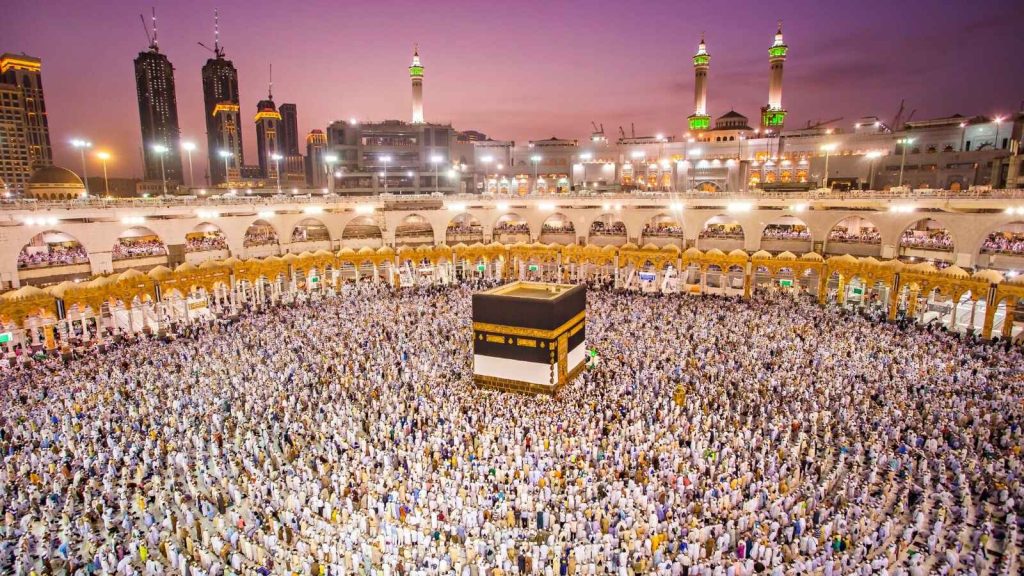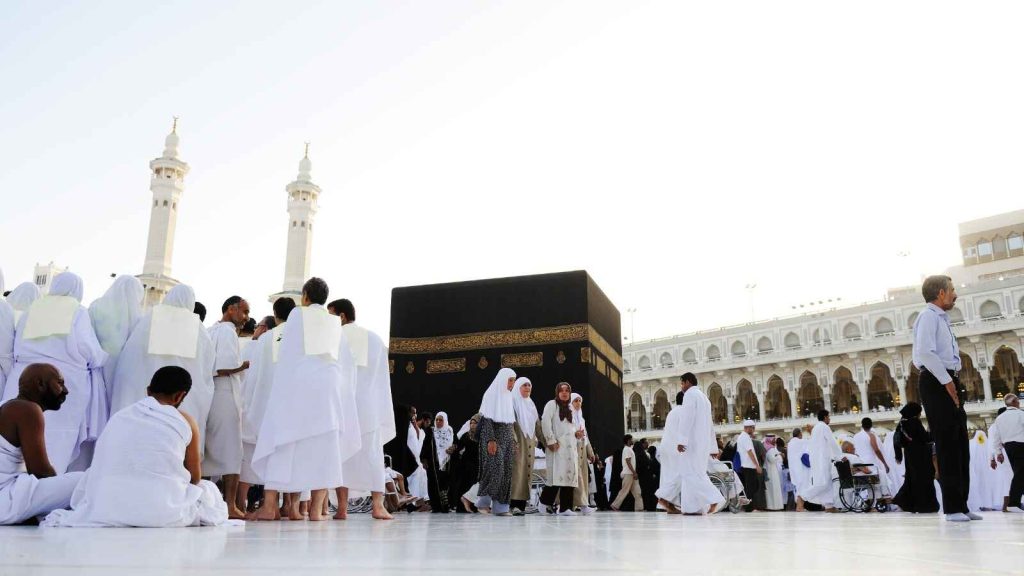What is the Hajj definition?
Hajj (Arabic: حَجّ) is a holy journey that every Muslim must undertake at least once in their lifetime. Hajj meaning in English is to intend a journey. It is one of the five pillars of Islam. Every year, millions of Muslims from around the world travel to Makkah in Saudi Arabia to perform Haj. It occurs annually during the sacred month of Dhul Hijjah, the twelfth month of the Islamic calendar. It starts on the 8th of Dhul Hijjah and lasts around five to six days. Muslims worldwide celebrate the four-day festival of Eid al-Adha or eid hajj on the 10th day of Dhul Hijjah. Muslims are enjoined by Allah (SWT) to fulfill the sacred pilgrimage of Haj, as stated in the Holy Qur’an.[Al Fath : 27]
“God willing, you will enter the Sacred Mosque in safety, with heads shaved or hair trimmed, without any fear. God knows what you do not know; He has ordained, in place of the hardship, ease.”

Eligibility and Exemptions for Hajj?
Although Al Hajj is obligatory for every Muslim, it is only obligatory if they have the means to fulfill it. Certain conditions determine the eligibility of Muslims to perform Hajj or exempt them from doing so. Which is included mental sound health, physically and financially capablity of undertaking the journey
What is Hajj in Islam?
The sacred hajj pilgrimage consists of a sequence of rites and rituals, some of which are sequential, presenting a spiritual, emotional, and physical test for the pilgrim. During Haj, pilgrims usually walk between 5km to 15km each day because they need to move between different places in and around Makkah. Hajj is a religious obligation and one of the fundamental pillars of Islam, often considered a once-in-a-lifetime experience for many. It is permissible to perform Haj more than once in a lifetime, provided one sincerely seeks the pleasure of Allah (SWT), which means ‘The Most Glorified, The Most High.’ According to our Prophet Hazrat Muhammad (PBUH):
“Anyone who performs Haj purely for the sake of Allah, refraining from speaking indecently or committing wrong, will return (sinless) just as his mother bore him.”

Steps of hajj (Manasik Hajj)
- Preparation and Intentions
- Initiate the state of Ihram
- Perform Tawaf seven times around the Kaaba
- Detour between Safa and Marwah
- shave your hair (completion of Umrah)
- Rest and Offer Prayers
- Enter Ihram once again
- Reach the area of Mina
- Observance of the Day of ‘Arafah
- Stay overnight at Muzdalifah
- Perform the ritual of Rami (stoning the devil)
- Offer Qurbani (sacrifice)
- Shave the head
- Perform Tawaf al-Ifadha
- Perform Rami again
- Stay overnight at Mina
- Perform Rami again
- Conclude with the Farewell Tawaf (Tawaf al-Wida)
Hajj dua
The Talbiyah is a prayer recited by Muslim pilgrims, affirming their intention to perform Hajj solely for the sake of Allah’s glory.
لَبَّيْكَ اللَّهُمَّ لَبَّيْكَ ، لَبَّيْكَ لَا شَرِيكَ لَكَ لَبَّيْكَ ، إِنَّ الْحَمْدَ وَالنِّعْمَةَ لَكَ وَالْمُلْكَ ، لَا شَرِيكَ لَكَ
Hajj clothes (Ihram clothing)
Ihram clothing, worn by Muslim people during Haj or Umrah pilgrimages, is meant to keep things simple and avoid drawing attention. For men, it’s usually two white sheets without stitching, often made of towel material. One is wrapped around the top (called ridāʾ) and the other around the bottom (izār), secured with a belt, and sandals are worn. Women’s clothing differs depending on regions and beliefs, but generally, they don’t wear anything special or cover their faces.
When is Hajj 2024?
The Hajj for 2024 is scheduled to commence on Friday, June 14th, and will conclude on Wednesday, June 19th, 2024. This date is provisional since the exact date relies on the sighting of the moon for Dhul Hijjah, 1445, which is the twelfth and final month of the Islamic Calendar.
Difference between Hajj and Umrah
Haj and Umrah are both revered journeys in Islam and have numerous common aspects, rituals, and practices. However, there are significant distinctions between them, with one of the most notable being that Haj is one of the five pillars of Islam and obligatory for every Muslim who is capable, while Umrah is a voluntary act of pilgrimage. Some differences are here:
- Hajj occurs between the 8th and 12th or 13th of Dhul Hijjah annually, whereas Umrah can be perform at any time throughout the year.
- Haj typically spans around five to six days (depending on the sighting of the crescent moon), while Umrah can be completed in a much shorter timeframe, sometimes even just in a day!

